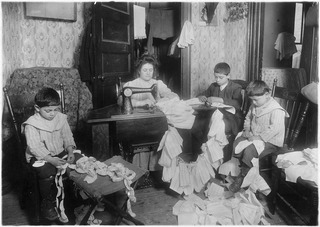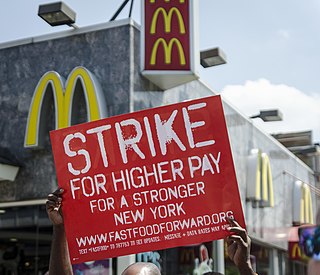Related Research Articles
A minimum wage is the lowest remuneration that employers can legally pay their employees—the price floor below which employees may not sell their labor. Most countries had introduced minimum wage legislation by the end of the 20th century. Because minimum wages increase the cost of labor, companies often try to avoid minimum wage laws by using gig workers, by moving labor to locations with lower or nonexistent minimum wages, or by automating job functions. Minimum wage policies can vary significantly between countries or even within a country, with different regions, sectors, or age groups having their own minimum wage rates. These variations are often influenced by factors such as the cost of living, regional economic conditions, and industry-specific factors.

A sweatshop or sweat factory is a crowded workplace with very poor or illegal working conditions. The manual workers are poorly paid, work long hours, and experience poor working conditions. Some illegal working conditions include poor ventilation, little to no breaks, inadequate work space, insufficient lighting, or uncomfortably/dangerously high or low temperatures. The work may be difficult, tiresome, dangerous, climatically challenging, or underpaid. Workers in sweatshops may work long hours with unfair wages, regardless of laws mandating overtime pay or a minimum wage; child labor laws may also be violated. Women make up 85 to 90% of sweatshop workers and may be forced by employers to take birth control and routine pregnancy tests to avoid supporting maternity leave or providing health benefits. The Fair Labor Association's "2006 Annual Public Report" inspected factories for FLA compliance in 18 countries including Bangladesh, El Salvador, Colombia, Guatemala, Malaysia, Thailand, Tunisia, Turkey, China, India, Vietnam, Honduras, Indonesia, Brazil, Mexico, and the US. The U.S. Department of Labor's "2015 Findings on the Worst Forms of Child Labor" found that "18 countries did not meet the International Labour Organization's recommendation for an adequate number of inspectors."

Fast Food Nation: The Dark Side of the All-American Meal is a 2001 book by Eric Schlosser. First serialized by Rolling Stone in 1999, the book has drawn comparisons to Upton Sinclair's 1906 muckraking novel The Jungle. The book was adapted into a 2006 film of the same name, directed by Richard Linklater.

Nickel and Dimed: On (Not) Getting By in America is a book written by Barbara Ehrenreich. Written from her perspective as an undercover journalist, it sets out to investigate the impact of the 1996 welfare reform act on the working poor in the United States.

A living wage is defined as the minimum income necessary for a worker to meet their basic needs. This is not the same as a subsistence wage, which refers to a biological minimum, or a solidarity wage, which refers to a minimum wage tracking labor productivity. Needs are defined to include food, housing, and other essential needs such as clothing. The goal of a living wage is to allow a worker to afford a basic but decent standard of living through employment without government subsidies. Due to the flexible nature of the term "needs", there is not one universally accepted measure of what a living wage is and as such it varies by location and household type. A related concept is that of a family wage – one sufficient to not only support oneself, but also to raise a family.

The working poor are working people whose incomes fall below a given poverty line due to low-income jobs and low familial household income. These are people who spend at least 27 weeks in a year working or looking for employment, but remain under the poverty threshold.

The National Minimum Wage Act 1998 creates a minimum wage across the United Kingdom. From 1 April 2024, the minimum wage is £11.44 for people aged 21 and over, £8.60 for 18- to 20-year-olds, and £6.40 for 16- to 17-year-olds and apprentices.

David Edward Card is a Canadian-American labour economist and the Class of 1950 Professor of Economics at the University of California, Berkeley, where he has been since 1997. He was awarded half of the 2021 Nobel Memorial Prize in Economic Sciences "for his empirical contributions to labour economics", with Joshua Angrist and Guido Imbens jointly awarded the other half.

Piece work or piecework is any type of employment in which a worker is paid a fixed piece rate for each unit produced or action performed, regardless of time.
Worker centers are non-profit community-based mediating organizations that organize and provide support to communities of low wage workers who are not already members of a collective bargaining organization or have been legally excluded from coverage by U.S. labor laws. Many worker centers in the United States focus on immigrant and low-wage workers in sectors such as restaurant, construction, day labor and agriculture.

In the United States, the minimum wage is set by U.S. labor law and a range of state and local laws. The first federal minimum wage was instituted in the National Industrial Recovery Act of 1933, signed into law by President Franklin D. Roosevelt, but later found to be unconstitutional. In 1938, the Fair Labor Standards Act established it at 25¢ an hour. Its purchasing power peaked in 1968, at $1.60 In 2009, it was increased to $7.25 per hour, and has not been increased since.
The New York State Department of Labor is the department of the New York state government that enforces labor law and administers unemployment benefits.
The Employment Policies Institute is a fiscally conservative, non-profit American think tank that conducts and publishes research on employment issues, particularly aimed towards reducing the minimum wage. It was established in 1991 by Richard Berman, and it has been described as "a nonprofit research group that studies issues of entry-level employment."

Criticism of fast food includes claims of negative health effects, animal cruelty, cases of worker exploitation, children-targeted marketing and claims of cultural degradation via shifts in people's eating patterns away from traditional foods. Fast food chains have come under fire from consumer groups, such as the Center for Science in the Public Interest, a longtime fast food critic over issues such as caloric content, trans fats and portion sizes. Social scientists have highlighted how the prominence of fast food narratives in popular urban legends suggests that modern consumers have an ambivalent relationship with fast food, particularly in relation to children.

Wage theft is the failing to pay wages or provide employee benefits owed to an employee by contract or law. It can be conducted by employers in various ways, among them failing to pay overtime; violating minimum-wage laws; the misclassification of employees as independent contractors; illegal deductions in pay; forcing employees to work "off the clock", not paying annual leave or holiday entitlements, or simply not paying an employee at all.
The 12th Independent Spirit Awards, honoring the best in independent filmmaking for 1996, were announced on March 22, 1997. It was hosted by Samuel L. Jackson.

The Fight for $15 is an American political movement advocating for the minimum wage to be raised to USD$15 per hour. The federal minimum wage was last set at $7.25 per hour in 2009. The movement has involved strikes by child care, home healthcare, airport, gas station, convenience store, and fast food workers for increased wages and the right to form a labor union. The "Fight for $15" movement started in 2012, in response to workers' inability to cover their costs on such a low salary, as well as the stressful work conditions of many of the service jobs which pay the minimum wage.

Sarumathi "Saru" Jayaraman is an American attorney, author, and activist from Los Angeles, California. She is an advocate for fair wages for restaurant workers and other service workers in the United States. In the aftermath of September 11, she co-founded the non-profit public service organization Restaurant Opportunities Centers United. And in 2013 she founded a new organization to work on these issues, called One Fair Wage. Jayaraman is a recipient of the Ashoka fellowship in 2013 and the Soros Equality Fellowship in 2020.

United Voices of the World (UVW) is an independent grassroots trade union, established in London in 2014.
On the 1st May 2014 Seattle's Mayor Ed Murray announced plans to increase Seattle's minimum wage to $15 per hour incrementally over the next few years. Seattle was the first big city in the United States to raise its minimum wage to $15 after the rise of the "Fight for 15 movement". This policy decision resulted in Seattle having the highest minimum wage of any major city in the United States. Once Seattle raised its minimum wage many other major cities around the country also took action to increase the pay of low wage workers. There has been much debate over the effects the increases to the minimum wage have had on employment and overall economic conditions in Seattle. To determine the impacts of the policy a number of studies have been conducted; the most notable being research by the University of Washington and the University of California, Berkeley.
References
- ↑ "American Job (1996)". Archived from the original on 2011-03-14. Retrieved 2010-10-09.
- ↑ "American Job (1996)". amazon.com. ASIN B001CSNX76.
- 1 2 3 4 "Chris Smith: American Director". nysun.com. Aug 29, 2008. Retrieved 2010-10-08.
- ↑ Official website
- 1 2 "American Job Review". Mar 9, 1998. Retrieved 2010-10-08.
- ↑ "American Job". Archived from the original on 2010-06-16. Retrieved 2010-10-09.
- ↑ 12th annual Spirit Awards ceremony - FULL SHOW | 1997 | Film Independent on YouTube